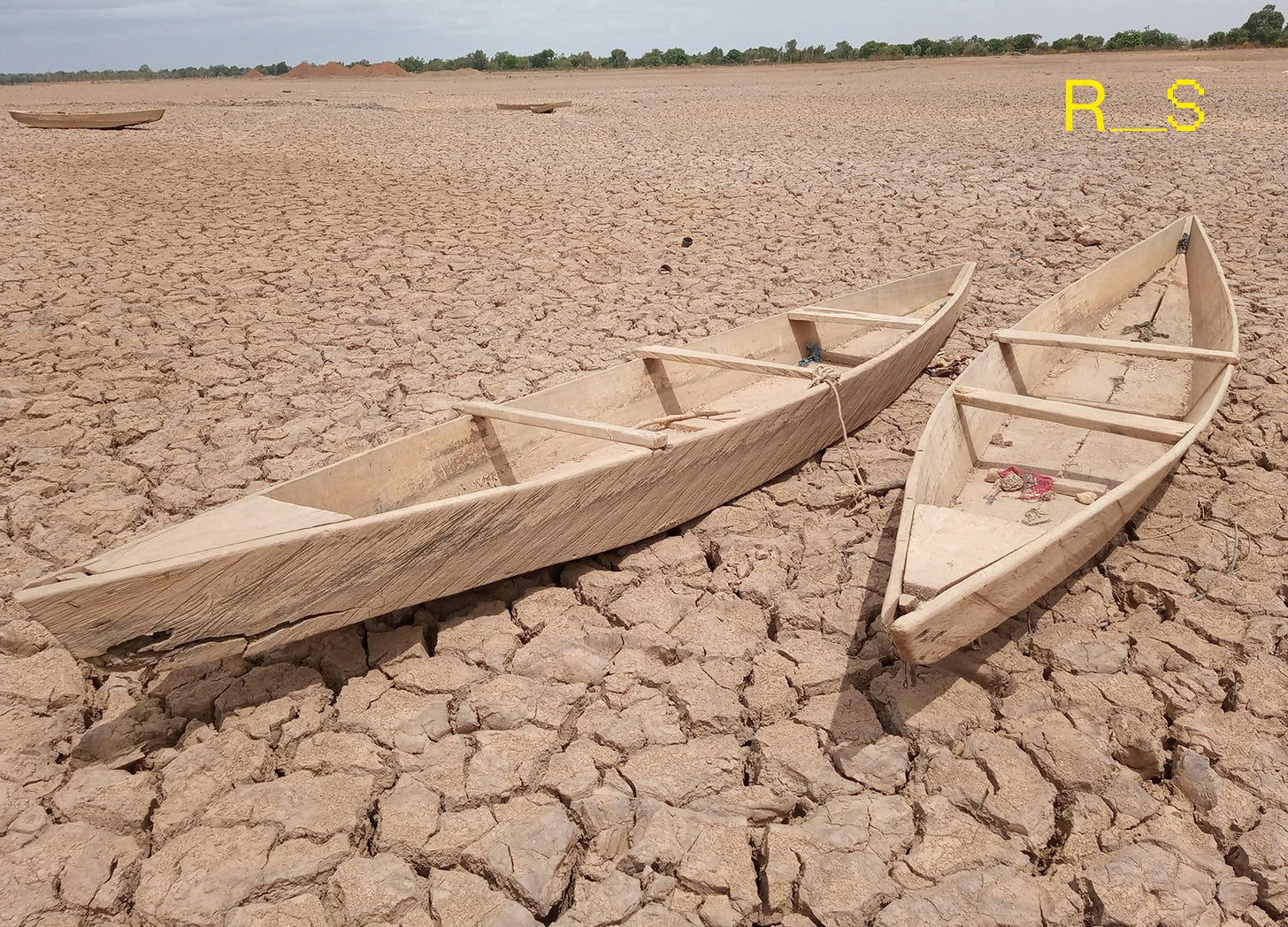Hot Planet Update: Record Low Arctic Ice, Worst-Ever Korean Wildfires, Just Stop Oil Pivot, Earth's Land is Drying Out, EV Shake-Up, & More
A roundup of what happened, why it matters, and key context for climate change news during the week of March 23-29.

Welcome to “Hot Planet Update,” a series on Reality Studies that recaps the biggest news in climate from the last week. Using a “smart brevity” format, Last Week in Climate recaps are designed to keep you up-to-date on the latest news and provide key context.
The first half of each HPU is available for free subscribers, and the full post is available to paid subscribers. Subscribe now so you never miss an installment!
1. Arctic Sea Ice Hits Lowest Winter Peak on Record
👉 The Arctic’s winter ice cap shrank to an unprecedented low extent, highlighting accelerating polar warming.
Arctic sea ice reached a winter maximum of only 14.33 million km² this month—about 800,000 km² (an area larger than Texas) below the previous record low in 2017—the smallest since satellite monitoring began in 1978.
Low winter peak doesn’t guarantee a record summer melt, but it continues “the overall long-term decline” of Arctic sea ice. Meanwhile, Antarctic sea ice also hit near-record lows, pushing global sea ice to an all-time minimum in February.
Less ice means darker oceans absorb more heat, amplifying warming and disrupting weather patterns.
Why It Matters: The vanishing ice is a barometer of climate health. This milestone demonstrates that even winter can’t rebuild ice like it used to, reinforcing the need to cut greenhouse gases before critical polar systems tip into irreversible decline.
MUD\WTR: Right now, get 30% off on starter packs using this link.
There’s four different adaptogen blends to choose from, but my current favorite is :rest, which helps me ramp down from long days and feel ready for sleep.
2. “Worst Wildfires in History” Ravage South Korea
👉 South Korea battled its largest wildfires on record, with lives lost and cultural treasures destroyed.
Wildfires swept through southeastern provinces, killing at least 28 people and scorching nearly 118,265 acres—the worst in the nation’s history. More than 38,000 residents were forced to flee.
The flames reduced the 1,300-year-old Gounsa Buddhist Temple to ashes, wiping out a national treasure. Firefighters raced to protect other UNESCO World Heritage sites as the fires encroached.
Thousands of firefighters, soldiers, and helicopters were deployed to contain the disaster. By week’s end, authorities had the major fires 94% contained, aided by a turn in weather and round-the-clock efforts.
Why It Matters: Wildfires of this scale are unprecedented in South Korea, a country not usually prone to such blazes. The tragedy highlights how climate change is expanding extreme fire risk to new regions. It’s a wake-up call on preparedness, forest management, and the global reach of climate-fueled disasters.
Minna Salami: Can Feminism Be African? | #45
Welcome to the Urgent Futures podcast, the show that finds {signals} in the noise. Each week, I sit down with leading thinkers whose research, concepts, and questions clarify the chaos, from culture to the cosmos.
3. China Expands Carbon Market to Heavy Industries
👉 China moved to pull its biggest polluting industries into its carbon trading market, a major step in the world’s top emitter’s climate fight.
Beijing announced plans to include the steel, cement, and aluminum sectors in China’s national emissions trading scheme. About 1,500 additional industrial firms will be required to buy carbon credits if they exceed pollution caps.
This expansion will boost the carbon market’s coverage to 8 billion tons of CO₂, over 60% of China’s total emissions. China’s carbon market, launched in 2021 for power plants, is already the world’s largest; adding heavy industry further broadens its reach.
Officials say carbon trading will prod companies to retire dirty facilities and invest in low-carbon tech. Initially, only the worst emitters in each sector must buy permits (with 2024 emissions used as a free baseline). Over time the caps will tighten, forcing deeper cuts.
Why It Matters: China’s move is a big climate policy signal. Heavy industry is notoriously hard to decarbonize—bringing it into a carbon market is crucial for China to peak and then cut emissions. It shows the world that China is seeking market-based tools to tackle climate change, which could spur broader global efforts or linkages in carbon pricing.
4. Earth’s Land is Drying Out, Scientists Sound Alarm
👉 A new global study finds that soils and land worldwide are losing moisture at an accelerating rate, a hidden impact of climate change with dire implications.
Using NASA’s GRACE satellite data (which tracks Earth’s gravity), researchers found a steady loss of water from land since the early 2000s. The study shows a clear global trend of declining terrestrial water storage—in other words, the planet’s land masses are drying out over time.
Two significant “step down” decreases in soil moisture occurred: an “unusual” dry period around 2000-2003 and another during the strong El Niño of 2015-2016, after which soils didn’t fully recover. Even after wetter years, the baseline stayed drier than before. Scientists fear another strong El Niño could trigger yet another sharp drop.
Unlike floods or wildfires, drought sneaks up. The data show many regions in a long-term aridification trend, especially in mid-latitudes. It’s a vicious cycle: as lands dry, people pump more groundwater for agriculture, which in turn further depletes water reserves.
Why It Matters: This confirms what climate models have predicted—dry areas getting drier as the world warms. Diminishing soil moisture threatens crop yields and water supplies for billions. Droughts will become more frequent and intense, even if rainfall temporarily returns. The study is a warning that we may already be sliding into a drier future, requiring urgent action on water management and climate mitigation to buffer against permanent drought.
5. Climate Protest Group “Just Stop Oil” Calls It Quits
👉 After three years of headline-grabbing stunts and arrests, UK climate activist group Just Stop Oil is ending its disruptive protests, marking a shift in climate activism.
Just Stop Oil announced it will “hang up the hi-vis” (orange vests) at the end of April, with one last big demonstration in London. Since launching in 2022, the group became infamous for civil disobedience tactics—from blocking highways to throwing soup on Van Gogh’s paintings—all to demand a halt to new oil projects.
After dozens of members were arrested and even jailed, the group claims it has succeeded in raising public awareness. JSO’s Hannah Hunt said that after three years “in a blaze of orange,” the campaign will wind down. The decision may also reflect strategic recalibration: public tolerance for disruptions was wearing thin, and UK authorities were cracking down with tougher laws.
Why It Matters: JSO has been a polarizing fixture of the climate debate—hailed by some for sounding the alarm, reviled by others for tactics. Its shutdown is a notable moment in climate activism, suggesting that activists are reassessing how to build public support. The climate crisis hasn’t gone away, so the question is what new strategies will emerge to keep pressure on governments and companies to act.
Mission Farms CBD: My favorite CBD, full stop. They farm the hemp organically on a small Oregon farm, tend every plant by hand, and test for purity four times: the soil, the hemp, the hemp-extract, and the final products.
Go to this link and sign up for emails to get 25% off + free shipping on your first order.
6. U.S. Supreme Court Shuts Down Youth Climate Lawsuit
👉 A high-profile climate case by a group of young Americans was blocked by the Supreme Court, dealing a blow to climate litigation.
The U.S. Supreme Court declined to hear Juliana v. United States, a lawsuit by 21 youth plaintiffs who argued federal fossil fuel policies violate their constitutional rights. The Court offered no explanation for turning away the case.
The litigants had asserted that the government’s promotion of oil, gas, and coal infringes on their right to a stable climate. They sought a court order for the government to develop a science-based plan to phase out carbon emissions.
By declining to take up the case, the Supreme Court leaves in place lower court roadblocks. The youth activists say they will explore other legal avenues and state courts to press their claims.
Why It Matters: This was a landmark attempt to use the courts to force climate action. The outcome underscores the challenges climate advocates face in the judiciary. While it’s a disappointment for climate campaigners, it has intensified debate about governmental duty to protect young citizens from climate harm—an issue likely to resurface in other forms.
Want to read the remaining 6 stories? Join Reality Studies as a paid subscriber:








